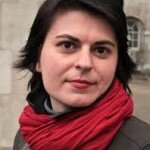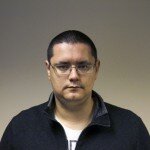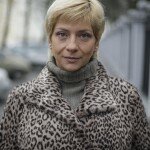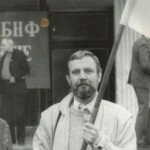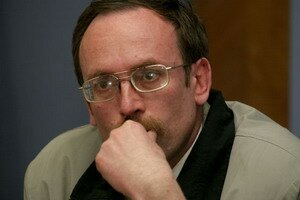
When the political prisoners are released, and refugees return, will ever Ploshcha win? You will tell that the questions should be addressed to fortune teller, and not to politicians and political prisoners. However, the life and state of mind of many Belarusians depends on that questions. About this and many other issues we had an honest talk with one of the first political prisoners of free Belarus – Vyacheslav Sivchyk.
– You have always said that you moved from Belarus to Ukraine temporarily. Did you manage to sort out your life there?
– Sorting out my life in exile was never my goal. I have been in Ukraine, since February 2011. The authorities tried to illegally arrest me several times (usually under criminal paragraphs) in Belarus in 2010. They have finally managed to imprison me on July 27. There was also another attempt on Dec. 18, the day after the events in the Square. In spite of that I got to the Square on December 19, and in spite of the fact that I was inbetween the building of the Government and a cordon of special forces, I managed to get out of the square. I would like to reiterate what I said in previous interviews. I was near the Government building at a time when presidential candidates Mikola Statkevich and Andrei Sannikov were invited inside to allegedly hold talks with the leadership of the police. There were, of course, no talks, instead the special forces started brutal pacification of the Square. In the morning of December 20 it was clear that Belarus has once again collided with a wave of mass repressions. I watched wholly inadequate to the situation use of force by the authorities not only on Independence Square, where people were deliberately hurt, including girls and women. I also had a chance to see these inadequate actions of Lukashenko’s special forces in the area of Freedom Square. At night it was already clear that the authorities arrested seven of the nine rivals of Lukashenko (as you know Romanchuk and Tereshchenko, were not arrested as they agreed to appear on television with the previously prepared by the KGB speeches. In which they have presented totally different version of happenings, everything has been turned upside down and the people who were wrongfully beaten and arrested, were accused by them of breaking the law). On December 20, I was leading the first, after the protests, press conference at the BPF headquarters. Among the participants were representatives of the main oppositional political forces of Belarus, who told the truth about the events of December 19. Until the day of the conference, were released two presidential candidates who agreed to be interviewed by TV in a slightly less radical form than Romanchuk. On December 21 I took part in a press conference of the opposition, that presented two demands: the release of illegally detained and non-recognition of the so-called presidential elections of December 19, 2010. Unfortunately, my quasi-legal activity was interrupted on December 25, when KGB organized tens of searches in oppositionists’ flats. Among other things, in connection with criminal proceedings related to the events on the Square, the authorities conducted a search at place of my permanent residence. Knowing that I would be arrested at the first opportunity, I remained in Minsk for another month and a half. I left because I did not expect so severe wave of repression in Belarus, and the absence of adequate response from the West.
– Are you thinking about taking to Kiev, or another Ukrainian city your family? And if not, are you planning to return to Belarus?
– I have never intended to take my family to Kiev. Aside from the fact that I never had such opportunities. Even at the first public press conference in Ukraine I was forced to answer questions about my return. I replied that I will come back, when Mikola Statkevich and Dzmitrij Dashkievich are released.
– How are treating you the Ukrainian authorities? Are other political refugees from Belarus in a similar situation as you?
– The Ukrainian authorities are rather neutral. (At the time of the interview Vyacheslav Sivchyk was in one of the countries of the European Union – Palitviazni.info).I have never commented on the issues concerning Ukraine’s internal political, because I always stress that I am a guest in Ukraine. I’m in Ukraine, so as many of my countrymen. I have know many members of the Verkhovna Rada of Ukraine know since the 90’s, when I was a member of the Belarusian Popular Front leadership “Adradzenie”. With many of them I befriended myself when I was a Belarussian group coordinator during the Orange Revolution.
In Ukraine, I’ve never been a political refugee. It just happened that I could not stay in Belarus. I know many Belarusians who were seeking political exile in Ukraine. Generally such attempts do not make no sense. Ukraine, in contrast to the European Union countries, does not provide a separate status for Belarusians fighting against Lukashenko.
– Could events on the Square in 2006 and 2010 change the situation in the country? And what, in your opinion, was missing to do that?
– They could. One should not think that the situation in Belarus is hopeless. The absolute majority of the Belarusian people want to live a normal life. Therefore, they do not need Lukashenko and his regime. However, since 1996, there has been no real election in Belarus. Thus, by using manipulation the majority becomes the minority, so called fifth column, but this was changed when Lukashenko was obliged to carry out the so-called presidential elections. At that moment, the people of Belarus gained a chance, quite difficult, but not impossible, to use.
What was missing? The answer does not apply to the situation inside Belarus. Belarus needs to go out from the Russian Federation’s umbrella of influence.
– Often you organize in Ukraine events, concerned with Belarusian history and the present time. What do you want to achieve in this way? Do you manage to achieve your goals? What does not allow us to forget, like a bad dream, to be able to continue a normal life?
– Together with my colleagues in Ukraine I have conducted hundreds of such events. Such events were organized with the support and participation of Ukrainian patriots, representing various political parties and social organizations. Purpose of such events has been achieved. We upheld Belarusians morally, especially those who in unbearable conditions, organized protests in Belarus. At the same time we forced Ukraine to look at Belarus through our eyes, and not through the perspective of political manipulation.
– Do you know anything about the fate of the Ukrainians, who were politically persecuted in Belarus?
– The point is that I have met all seven Ukrainians, who were arrested after the events of the Chernobyl Path-96. I was the only witness representing BFN party during the trial. The prosecutor did not take into consideration my testimony, which was probably due to the fact that I told the truth – after all, the Ukrainians were tortured in front of my eyes.
The leader of a group of Ukrainians Volodymyr Solowij I saw next time at the end of 2004, during the Orange Revolution. Mr. Volodymyr died on the day of presidential inauguration of Viktor Yushchenko. At the funeral on the Cemetery in Kiev I gave his son Kastus Kalinowski Order, as an expression of gratitude for what has done this courageous Ukrainian for Belarus. I met with some of the Ukrainians who were politically imprisoned in Belarus, on the fifteenth anniversary of the Chernobyl Path-96. In the UNIAN news agency there was held a joint press conference of the Solidarity Movement “Razam” and UNA-UNSO (Ukrainian National Assembly – Ukrainian National Self Defence). At this conference Sergei Potapov represented the Ukrainians. In 1996 he was sentenced to one year and three months of imprisonment and conditionally released from Belarusian prison. Unfortunately, during my stay in Ukraine I have not found Andrey Sheptytsky whom I last saw in Minsk on July 27, 1997 where he gave a speech at the opposition rally after his release from prison in Mahilou prison.
– Which of your arrests do you remember particularly and why?
– For sure the first one, on April 26, 1996, because it was unexpected. Before that time, I was detained several times, but the officers did not even write down the protocol. And after 1996, they knew that they could arrest anyone at any time …
palitviazni.info
